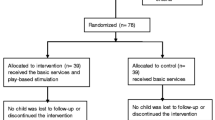Abstract
Objectives: This paper attempts to validate the programme of structured play lasting 90 minutes a day, for use in orphanages, to check if it can be replicated in other orphanages, with similar results.Methods : A 2-week workshop on the structured play scheme was conducted at the Missionaries of Charity Orphanage in Delhi, the venue of the original project. 15 MOC sisters from 6 centers attended the workshop. The authors selected the MOC orphanage at Chandigarh to track the benefits of the programme. The development quotient of all the residents between the ages of 6 months — 3 years was assessed by a pediatric-clinical-psychologist using the Development Assessment Scale for Indian Infants (DAS II) scale. A reassessment of all these children was done again 3 months after initiating the programme of structured play here.Results. The mean motor and mental scores at the orphanage in Chandigarh before the start of the intervention were 57.9 and 58.2 respectively. Post intervention assessments showed a rise of 23 points in both the scores.Conclusion: The development of children in orphanages rises dramatically after initiating a programme of play. The pre-intervention development scores is similar to that in a pilot study and the benefits after play was also similar. The play programme can be easily replicated in other orphanages with similar results
Similar content being viewed by others
References
Taneja V, Sriram S, Beri RS, Sreenivas V, Aggarwal R, Kaur R, Puliyel JM. Not by Bread Alone Project: Impact of a Structured 90 minute per day Play Session on Development of Children in an Orphanage.Child: Care, Health and Development, 2002; 28: 95–100.
Phatak P. Manual for using Indian adaptation of Bayley’s Scale of Infant Development; Based on Baroda Norms, Anand Agencies, Pune, India. 1995
Rutter M. Parent-child separation. Psychological effects on childrenJ Child Psychol and Psychiatry 1971; 12: 233.
Somen S. A Study of Mental Health Status of Children in orphanages at Bangalore:Indian Journal of Social Work 1986; 2: 137–145.
Broussard M. and Decarie T.G. The effects of three kinds of perceptual-social stimulation on the development of institutionalized infants.Early Child Care Dev 1971; 1: 111.
Sharma N. (1989) Infant Stimulation-Documentation of Research in Delhi. New Delhi UNICEF.
Hunt JM, Mohandessi K, Ghodssi M, Akiyama M. The Psychological development of orphanage-reared infants: interventions with outcomes (Tehran).Genetic Psychology Monographs 1976; 94: 177–226.
Author information
Authors and Affiliations
Corresponding author
Rights and permissions
About this article
Cite this article
Taneja, V., Beri, R.S. & Puliye, J.M. Play in orphanages. Indian J Pediatr 71, 297–299 (2004). https://doi.org/10.1007/BF02724092
Issue Date:
DOI: https://doi.org/10.1007/BF02724092




